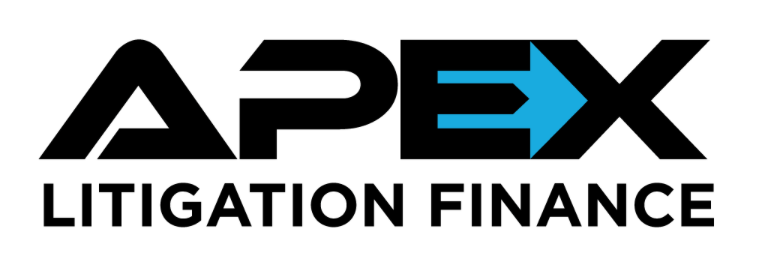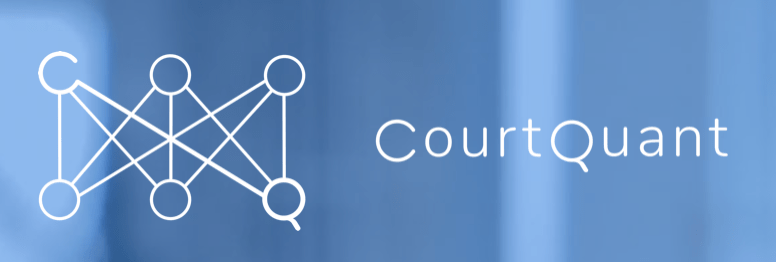
Does the use of NLP and ML techniques to crunch case law and find predictable patterns that point to an outcome indicate a coming revolution in litigation finance? Because if AI tools can give you a better chance of backing the best cases, in a sector of the legal world that is all about picking winners, then this tech could make a real difference.
To find out more Artificial Lawyer was recently invited along to a small gathering of litigation finance experts at Enterprise Chambers in London and had a chance to hear from Ludwig Bull, co-founder of legal AI prediction pioneer, CourtQuant, and the company’s new business partner, Maurice Power, CEO of Apex Litigation Finance – who now firmly believes that AI technology is going to revolutionise the way they do things.
The basic idea is simple for those used to dabbling with NLP and extracting patterns from unstructured data: you grab a large set of court documents that relate to a certain type of case; you analyse them and then extract patterns that can help you to create a meaningful model in relation to the outcome of similar matters.
You can also easily see why litigation finance companies might want to leverage these capabilities. Litigation finance is basically the same as betting at a horse race, but one where those making bets want as much information as possible before laying out their cash for a group of lawyers to win the case. I.e. they are choosing to bet or not long before the race even gets close to starting.

In the US it has been pioneered for several years (e.g. RAVEL/LexisNexis and Gavelytics). In the UK there is also Solomonic, which has worked with Stewarts Law and Herbert Smith Freehills. And early on we also saw Premonition in the market.
But, the general view among even some of those behind the tech companies doing this, is that it’s best to focus on very narrow aspects of a case, e.g. will a certain judge pass a certain motion, or can all the case law and court records provide a steer as to how some types of case will be viewed in particular courts?
This helps. For sure. But it’s far from a ‘you will win this case’, type of conclusion. One of the challenges is that large, complex disputes just have too many moving pieces.
So, what would change the dynamic? What would give the AI an edge and the litigation finance groups a better chance of making a smart money bet?
One solution is to focus on small to medium size disputes instead. There are more of them – so that gives a bigger data set. They can also be less complex – (although not always). And, if there are more of them then there is a higher potential to build more robust models, as there is more evidence to point to a certain pattern of outcomes.
I.e. for every super complex and almost unique LIBOR scandal, there are dozens of supplier disputes, or fall-outs related to SME insolvencies, often with very similar features.
AI systems are great at finding patterns where many humans would just give up under the sheer weight of complex data. Even so, they still need material that actually has patterns within in it to find and that are recurring enough to be meaningful.
Enter CourtQuant and Apex.
As Power explains, the cost of doing the case review of a small to medium size dispute is the same as a large one. A litigation funder has to leverage a bunch of people – usually lawyers – to assess the case and make their own predictions.

However, if AI analysis can speed up the assessment, and if it can provide a reliable prediction (because the data set is more responsive), then this changes the calculus.
Power adds that the approach evolves further, by then taking a lot more cases. Rather than just take on a handful of mega-bucks disputes and hope that one pays off, with better analytics they can spread cash across a volume of cases and hopefully get a better return overall.
‘For £100K to £1m claims in the market there is a need for funding. And, [with this method] risk is spread by investing in a volume of cases,’ he adds.
Apex has now created an online portal so funding seekers can apply directly and immediately CourtQuant can go to work modelling for:
- Outcome
- Settlement
- Timelines
- Quantum
‘The AI helps us to focus on what will be fundable and that means we can offer better terms to a claimant because of this too,’ Power adds.
I.e. the better the model, the more ‘the bookies’ can be sure it will win, so can give you better ‘odds on the bet’, to keep the horse race metaphor going.
Bull adds that they can provide insights via a dashboard and also help funders stop choosing counsel arbitrarily. This they will do by analysing the performance of firms and barristers via public records, something that Premonition pioneered some years ago. Although now, as Bulls explains, their proprietary technology offers a very broad and detailed insight into cases that goes far beyond what counsel to pick.
He reiterates the point that assessing by human lawyers costs as much for a small case as a huge case.
‘Litigation risk assessment is a high cost activity. Litigation funders have many staff working on this and it does not scale as a business,’ he adds.
They both note that as they go along they will be able to teach the system and it will improve.
They also add that, (hopefully), as their success grows, defending parties that hear Apex and CourtQuant have analysed and supported a claim will more quickly settle. And this would be an interesting development for the justice system, i.e. because a claim has got an ‘AI stamp of approval’ the other party loses confidence that they can win and just caves in.
This has far greater ramifications than for just litigation finance – but, we will have to wait to see if this happens.
And finally, they say that judges in the UK (and no doubt elsewhere) will be keen to see this approach as it may help to reduce or at least properly benchmark what the cost of a case should be.
Will this catch on? The good thing here is that it is going to be a clear case of proof of success. A litigation funder, if we keep up the bookies idea, will not continue to back bets based on bad intel. But, if it works they will certainly use it as much as they can. Why? Because they’ll make a lot of money.
And then…? It seems likely that if Apex and CourtQuant can succeed here then others will follow, because they’d be crazy not to use the same approach if it meant a better chance of backing the right horse.
And if not…? Then, we may have to wait a few more years before these techniques get to such a point that they do eventually move the market.
Whether it will be a short wait or a long one, remains to be seen.